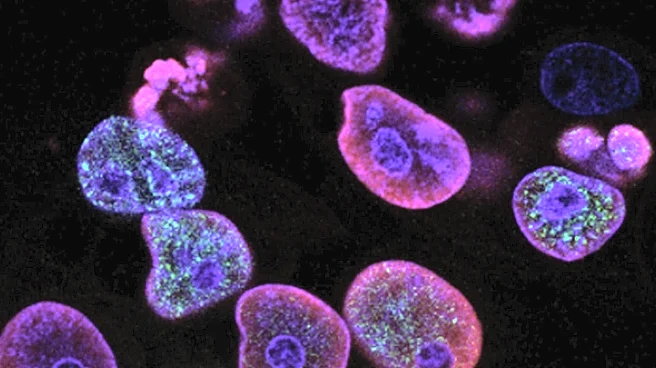What's Happening?
Fulgent Genetics, a company specializing in clinical diagnostics and therapeutic development, has shared preliminary data from its ongoing phase 2 clinical trial at the European Society for Medical Oncology (ESMO) conference. The trial investigates the efficacy
of FID-007 combined with cetuximab in treating recurrent or metastatic head and neck squamous cell carcinoma (R/M HNSCC). As of September 25, 2025, 39 patients have been randomized, with 36 receiving at least one dose of the treatment. The trial demonstrated meaningful anticancer efficacy, with objective response rates of 44% and 59% for different dosage arms, and a median progression-free survival of 7.8 months overall, compared to the historical 2.3 months for standard therapies. The treatment exhibited a favorable safety profile, with a 6% rate of serious adverse events.
Why It's Important?
The preliminary results from Fulgent Genetics' trial are significant as they suggest a potential advancement in the treatment of R/M HNSCC, a challenging cancer type with limited effective options. The improved progression-free survival rates and favorable safety profile could offer new hope for patients and healthcare providers. This development aligns with Fulgent's mission to enhance cancer care through comprehensive solutions, potentially impacting the precision medicine landscape. Success in this trial could lead to broader applications of FID-007, influencing treatment protocols and patient outcomes in oncology.
What's Next?
Fulgent Genetics plans to determine the optimal dose of FID-007 after further data maturation, which will support the continued development of this combination therapy. The company aims to transform into a fully integrated precision medicine entity, focusing on drug discovery and development. Stakeholders, including healthcare providers and patients, will be closely monitoring the final results and potential regulatory approvals. The trial's success could lead to expanded clinical applications and partnerships, further advancing Fulgent's position in the cancer treatment market.
Beyond the Headlines
The trial's success could have broader implications for the pharmaceutical industry, particularly in the development of nanoencapsulation technologies. Fulgent's approach to improving drug pharmacokinetics and reducing toxicity may set new standards for cancer treatment innovation. Additionally, the collaboration with institutions like the University of Southern California and Moffitt Cancer Center highlights the importance of partnerships in advancing medical research and development.














